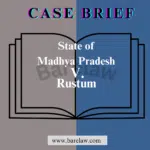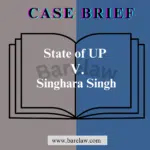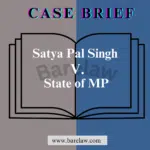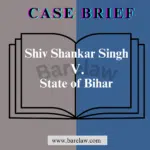
Table of Contents
State of Haryana v. Raja Ram
Date of Decision:
October 27, 1972
Facts
State of Haryana vs Raja Ram is a case that was heard by the Supreme Court of India in 1973. The case involved allegations of kidnapping and rape. The accused, Raja Ram, was charged under Sections 366 and 376/109 of the Indian Penal Code (IPC) for kidnapping and rape.
Facts:
- After investigation, Jai Narain and Raja Ram were both sent up for trial, the former under Sections 366 and 376, I.P.C. and the latter under Sections 366 and 376/109.
- The respondent was convicted under Section 366 I.P.C.
- High Court acquitted respondent Raja Ram.
- The evidence on record establishes beyond doubt that the prosecutrix had been solicited and persuaded by Raja Ram to leave her father’s house for being taken to the Bhishamwala well.
- It was in our opinion, not at all necessary for Raja Ram himself to go to the house of the prosecutrix at midnight to bring her from there.
- Nor does the fact that the prosecutrix had agreed to accompany Raj Ram to Bhishamwala well take the case out of the purview of the offence of kidnapping from lawful guardianship as contemplated by Section 361, I.P.C.
- On these facts, it is difficult to hold that Raja Ram was not guilty of taking or enticing the prosecutrix out of the keeping of her father’s lawful guardianship.
The trial court convicted Raja Ram of both kidnapping and rape, but the High Court acquitted him of the rape charge and convicted him only of kidnapping. The prosecution had alleged that Raja Ram had kidnapped a young woman named Kailash from her father’s house and taken her to a well, where he raped her. The Supreme Court ultimately upheld Raja Ram’s conviction for kidnapping, finding that he had taken Kailash from her father’s house without her consent and against her will.
The Court rejected Raja Ram’s argument that Kailash had come to the well willingly, finding that there was no evidence to support this claim. The Court’s decision in this case established that consent must be given freely and voluntarily, and that any coercion or force used to obtain consent invalidates it.
The case is significant because it deals with the issue of consent in cases of kidnapping and sexual assault. In the end, the Supreme Court upheld the decision of the High Court and convicted Raja Ram under Section 361 of the Indian Penal Code (IPC) for kidnapping. The case is an important precedent in Indian legal history, as it helped to establish important principles regarding consent and the definition of kidnapping.
Issues
State of Haryana vs Raja Ram is a case that was heard by the Supreme Court of India in 1973. The case involved allegations of kidnapping and rape. The accused, Raja Ram, was charged under Sections 366 and 376/109 of the Indian Penal Code (IPC) for kidnapping and rape.
Issues:
- Whether Raja Ram was guilty under Section 361 of the IPC for the offence of kidnapping from lawful guardianship.
- Whether the fact that the prosecutrix had agreed to accompany Raja Ram to the well takes the case out of the purview of the offence of kidnapping from lawful guardianship as contemplated by Section 361, I.P.C.
The prosecution had alleged that Raja Ram had kidnapped a young woman named Kailash from her father’s house and taken her to a well, where he raped her. The trial court convicted Raja Ram of both kidnapping and rape, but the High Court acquitted him of the rape charge and convicted him only of kidnapping.
The Supreme Court ultimately upheld Raja Ram’s conviction for kidnapping, finding that he had taken Kailash from her father’s house without her consent and against her will. The Court rejected Raja Ram’s argument that Kailash had come to the well willingly,
finding that there was no evidence to support this claim. The Court’s decision in this case established that consent must be given freely and voluntarily, and that any coercion or force used to obtain consent invalidates it. The case is significant because it deals with the issue of consent in cases of kidnapping and sexual assault.
The Court held that Raja Ram was guilty under Section 361 of the IPC for the offence of kidnapping from lawful guardianship. The Court found that Raja Ram had solicited and persuaded Kailash to leave her father’s house and accompany him to the well.
The Court held that Raja Ram’s actions amounted to taking or enticing Kailash out of the keeping of her father’s lawful guardianship. In conclusion, State of Haryana vs Raja Ram is an important case in Indian legal history, as it helped to establish important principles regarding consent and the definition of kidnapping.
The case clarified that consent must be given freely and voluntarily, and that any coercion or force used to obtain consent invalidates it. The case also established that taking or enticing a person out of the keeping of their lawful guardianship amounts to kidnapping.
Holding
State of Haryana vs Raja Ram is a case that was heard by the Supreme Court of India in 1973. The case involved allegations of kidnapping and rape. The accused, Raja Ram, was charged under Sections 366 and 376/109 of the Indian Penal Code (IPC) for kidnapping and rape.
Holdings:
- Raja Ram was guilty under Section 361 of the IPC for the offence of kidnapping from lawful guardianship.
- The fact that the prosecutrix had agreed to accompany Raja Ram to the well does not take the case out of the purview of the offence of kidnapping from lawful guardianship as contemplated by Section 361, I.P.C.
- The prosecution had alleged that Raja Ram had kidnapped a young woman named Kailash from her father’s house and taken her to a well, where he raped her. The trial court convicted Raja Ram of both kidnapping and rape, but the High Court acquitted him of the rape charge and convicted him only of kidnapping.
The Supreme Court ultimately upheld Raja Ram’s conviction for kidnapping, finding that he had taken Kailash from her father’s house without her consent and against her will. The Court rejected Raja Ram’s argument that Kailash had come to the well willingly, finding that there was no evidence to support this claim. The Court held that Raja Ram was guilty under Section 361 of the IPC for the offence of kidnapping from lawful guardianship.
The Court found that Raja Ram had solicited and persuaded Kailash to leave her father’s house and accompany him to the well. The Court held that Raja Ram’s actions amounted to taking or enticing Kailash out of the keeping of her father’s lawful guardianship.
The Court clarified that the fact that Kailash had agreed to accompany Raja Ram to the well did not take the case out of the purview of the offence of kidnapping from lawful guardianship as contemplated by Section 361, I.P.C. The Court held that Raja Ram was guilty of taking or enticing Kailash out of the keeping of her father’s lawful guardianship,
regardless of whether or not Kailash had agreed to go with him. In conclusion, State of Haryana vs Raja Ram is an important case in Indian legal history, as it helped to establish important principles regarding consent and the definition of kidnapping. The case clarified that taking or enticing a person out of the keeping of their lawful guardianship amounts to kidnapping. The case also established that consent must be given freely and voluntarily, and that any coercion or force used to obtain consent invalidates it.
Disposition
State of Haryana vs Raja Ram is a case that was heard by the Supreme Court of India in 1973. The case involved allegations of kidnapping and rape. The accused, Raja Ram, was charged under Sections 366 and 376/109 of the Indian Penal Code (IPC) for kidnapping and rape.
Disposition:
- Raja Ram was acquitted of the rape charge and convicted only of kidnapping.
- The Supreme Court upheld Raja Ram’s conviction for kidnapping under Section 361 of the IPC.
- The Court clarified that taking or enticing a person out of the keeping of their lawful guardianship amounts to kidnapping.
- The Court established that consent must be given freely and voluntarily, and that any coercion or force used to obtain consent invalidates it.
After investigation, Jai Narain and Raja Ram were both sent up for trial, the former under Sections 366 and 376, I.P.C. and the latter under Sections 366 and 376/109. The respondent was convicted under Section 366 I.P.C.
The High Court acquitted respondent Raja Ram of the rape charge and convicted him only of kidnapping. The Supreme Court ultimately upheld Raja Ram’s conviction for kidnapping, finding that he had taken Kailash from her father’s house without her consent and against her will.
The Court rejected Raja Ram’s argument that Kailash had come to the well willingly, finding that there was no evidence to support this claim. The Court held that Raja Ram was guilty under Section 361 of the IPC for the offence of kidnapping from lawful guardianship.
The Court found that Raja Ram had solicited and persuaded Kailash to leave her father’s house and accompany him to the well. The Court held that Raja Ram’s actions amounted to taking or enticing Kailash out of the keeping of her father’s lawful guardianship.
In conclusion, State of Haryana vs Raja Ram is an important case in Indian legal history, as it helped to establish important principles regarding consent and the definition of kidnapping. The case clarified that taking or enticing a person out of the keeping of their lawful guardianship amounts to kidnapping. The case also established that consent must be given freely and voluntarily, and that any coercion or force used to obtain consent invalidates it. The Supreme Court upheld Raja Ram’s conviction for kidnapping under Section 361 of the IPC.
Summary
State of Haryana v. Raja Ram is a case that was heard by the Supreme Court of India. The case involves the kidnapping of a minor girl named Santosh Rani by Raja Ram. Raja Ram was charged with kidnapping the minor girl and was acquitted by the trial court. The State of Haryana appealed against the acquittal, and the High Court reversed the decision and convicted Raja Ram.
Raja Ram then appealed to the Supreme Court of India. The Supreme Court held that the object of Section 361 of the Indian Penal Code (IPC) is to protect minors from being seduced for improper purposes as well as to protect the rights and privileges of guardians having lawful charge or custody of such minors. The Supreme Court also held that once the evidence of the prosecutrix is accepted, Raja Ram cannot escape conviction for the offence of kidnapping her from her father’s lawful custody.
The Supreme Court upheld Raja Ram’s conviction for the offence of kidnapping. The appeal of Jai Narain, who was also convicted along with Raja Ram, was dismissed by the High Court of Punjab & Haryana. The prosecution had alleged that Raja Ram had kidnapped a young woman named Kailash from her father’s house and taken her to a well, where he raped her.
The trial court convicted Raja Ram of both kidnapping and rape, but the High Court acquitted him of the rape charge and convicted him only of kidnapping.
The Supreme Court ultimately upheld Raja Ram’s conviction for kidnapping, finding that he had taken Kailash from her father’s house without her consent and against her will. The Court rejected Raja Ram’s argument that Kailash had come to the well willingly, finding that there was no evidence to support this claim. The Court held that Raja Ram was guilty under Section 361 of the IPC for the offence of kidnapping from lawful guardianship.
The Court found that Raja Ram had solicited and persuaded Kailash to leave her father’s house and accompany him to the well. The Court held that Raja Ram’s actions amounted to taking or enticing Kailash out of the keeping of her father’s lawful guardianship. In conclusion, State of Haryana vs Raja Ram is an important case in Indian legal history, as it helped to establish important principles regarding consent and the definition of kidnapping.
The case clarified that taking or enticing a person out of the keeping of their lawful guardianship amounts to kidnapping. The case also established that consent must be given freely and voluntarily, and that any coercion or force used to obtain consent invalidates it. The Supreme Court upheld Raja Ram’s conviction for kidnapping under Section 361 of the IPC.



